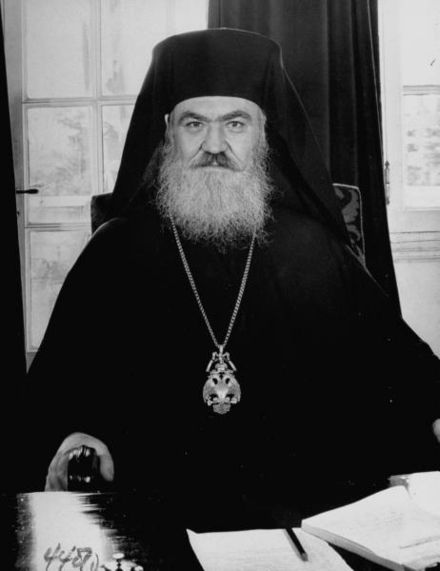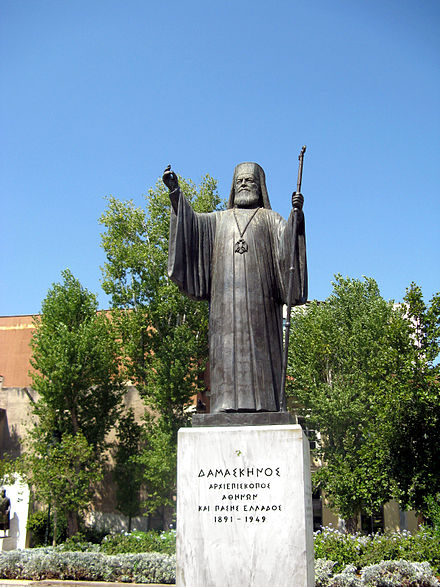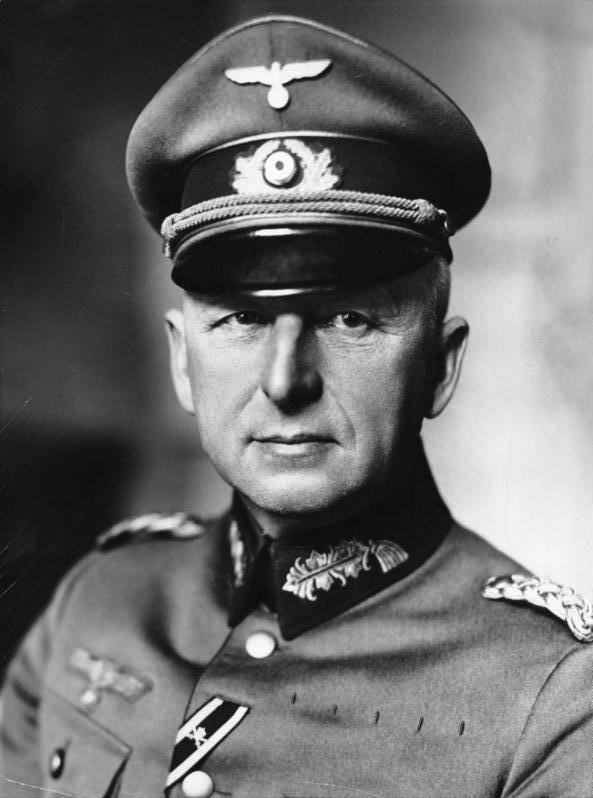Archbishop Damaskinos Papandreou
Aug 28, 2016 23:32:22 GMT
Napoleon Bonaparte and Quintus Fabius like this
Post by Ivan Kolev on Aug 28, 2016 23:32:22 GMT
Today, we talk about an incredibly brave man during WWII: Damaskinos Papandreou.


Top: Damaskinos Papandreou shortly following the Liberation of Greece from the Nazis in 1945.
Bottom: Statue of the Archbishop in Athens.
Dimitrios Papandreou was born in the Greek town Dorvita on March 3rd, 1891. He served in the Greek military during both Balkan Wars. He was later ordained as an Orthodox priest in 1917, and made the Archbishop of Corinth in 1922. He served other religious posts before being elected the Archbishop of Athens in 1938. Upon being elected, he took the name of Damaskinos. The fascist dictator of Greece, Ionnis Metaxis, refused to allow him to take the position, however, and forced him to renounce the title. A different Orthodox priest, Chrysanthus, was instead made the Archbishop of the city.
In 1940, World War II was brought to Greece. While initially being successful against the Italians, the Nazis stormed through the country in 1941, taking Athens on April 27th of that year. When the Nazis reached the capital, Athenians forced Chrysanthus to resign from his post as Archbishop, and Damaskinos became the new Archbishop. The Nazis were fine with the 'overthrow' of Chrysanthus, as Chrysanthus refused to attend the inauguration of Georgios Tsolakoglu, the Nazi puppet leader.
Damaskinos was the supreme spiritual leader of the Greek Orthodox people, and during the dark times of the Second World War, this was an especially tough position to live up to. Despite this, he still pledged to support all Greek people, no matter what religion or ideology they may be of. When the Nazis deported the 60,000 Sephardic Jews of Salonika, who were very detectable due to just recently being added to the Greek state in 1912, to death camps in Poland and Germany, Damaskinos wrote a letter to the Nazi authorities in Greece formally denouncing the deportations. The letter in part reads:
"The Greek Orthodox Church and the Academic World of Greek People Protest against the Persecution... The Greek people were... deeply grieved to learn that the German Occupation Authorities have already started to put into effect a program of gradual deportation of the Greek Jewish community... and that the first groups of deportees are already on their way to Poland...
According to the terms of the armistice, all Greek citizens, without distinction of race or religion, were to be treated equally by the Occupation Authorities. The Greek Jews have proven themselves... valuable contributors to the economic growth of the country [and] law-abiding citizens who fully understand their duties as Greeks. They have made sacrifices for the Greek country, and were always on the front lines of the struggle of the Greek nation to defend its inalienable historical rights...
In our national consciousness, all the children of Mother Greece are an inseparable unity: they are equal members of the national body irrespective of religion... Our holy religion does not recognize superior or inferior qualities based on race or religion, as it is stated: 'There is neither Jew nor Greek' and thus condemns any attempt to discriminate or create racial or religious differences. Our common fate both in days of glory and in periods of national misfortune forged inseparable bonds between all Greek citizens, without exemption, irrespective of race...
Today we are... deeply concerned with the fate of 60,000 of our fellow citizens who are Jews... we have lived together in both slavery and freedom, and we have come to appreciate their feelings, their brotherly attitude, their economic activity, and most important, their indefectible patriotism..."
This blatant rejection of Nazi authority was very courageous for the Archbishop, who was warned by Jürgen Stroop, the commander of German forces in Greece, not to publish the letter, threatening to execute him via firing squad if he did so. In response, Damaskinos simply said:
"According to the traditions of the Greek Orthodox Church, our prelates are hanged, not shot. Please respect our traditions!"
This was a bold move by Damaskinos to reply like this, but Stroop never retaliated. He went on to publish the letter. When the Germans began deporting the Athenian Jews, Damaskinos ordered all Greek Orthodox churches in the city to issue baptismal certificates to all Jews fleeing the Nazis. This order resulted in the saving of thousands of Athenian Jews.
Following the war, Damaskinos was seen as a hero, and was incredibly popular. Also following the war, Greece became divided between the communists, who wished to establish a Soviet friendly communist dictatorship and to abolish the monarchy, and the democrats, who wished to establish a constitutional monarchy. Damaskinos was the only person who could keep the country from going to war with itself, and was able to calm tensions between the opposing factions all the way until his death in 1949. Once he died, the Greek Civil War began.


Top: Damaskinos Papandreou shortly following the Liberation of Greece from the Nazis in 1945.
Bottom: Statue of the Archbishop in Athens.
Dimitrios Papandreou was born in the Greek town Dorvita on March 3rd, 1891. He served in the Greek military during both Balkan Wars. He was later ordained as an Orthodox priest in 1917, and made the Archbishop of Corinth in 1922. He served other religious posts before being elected the Archbishop of Athens in 1938. Upon being elected, he took the name of Damaskinos. The fascist dictator of Greece, Ionnis Metaxis, refused to allow him to take the position, however, and forced him to renounce the title. A different Orthodox priest, Chrysanthus, was instead made the Archbishop of the city.
In 1940, World War II was brought to Greece. While initially being successful against the Italians, the Nazis stormed through the country in 1941, taking Athens on April 27th of that year. When the Nazis reached the capital, Athenians forced Chrysanthus to resign from his post as Archbishop, and Damaskinos became the new Archbishop. The Nazis were fine with the 'overthrow' of Chrysanthus, as Chrysanthus refused to attend the inauguration of Georgios Tsolakoglu, the Nazi puppet leader.
Damaskinos was the supreme spiritual leader of the Greek Orthodox people, and during the dark times of the Second World War, this was an especially tough position to live up to. Despite this, he still pledged to support all Greek people, no matter what religion or ideology they may be of. When the Nazis deported the 60,000 Sephardic Jews of Salonika, who were very detectable due to just recently being added to the Greek state in 1912, to death camps in Poland and Germany, Damaskinos wrote a letter to the Nazi authorities in Greece formally denouncing the deportations. The letter in part reads:
"The Greek Orthodox Church and the Academic World of Greek People Protest against the Persecution... The Greek people were... deeply grieved to learn that the German Occupation Authorities have already started to put into effect a program of gradual deportation of the Greek Jewish community... and that the first groups of deportees are already on their way to Poland...
According to the terms of the armistice, all Greek citizens, without distinction of race or religion, were to be treated equally by the Occupation Authorities. The Greek Jews have proven themselves... valuable contributors to the economic growth of the country [and] law-abiding citizens who fully understand their duties as Greeks. They have made sacrifices for the Greek country, and were always on the front lines of the struggle of the Greek nation to defend its inalienable historical rights...
In our national consciousness, all the children of Mother Greece are an inseparable unity: they are equal members of the national body irrespective of religion... Our holy religion does not recognize superior or inferior qualities based on race or religion, as it is stated: 'There is neither Jew nor Greek' and thus condemns any attempt to discriminate or create racial or religious differences. Our common fate both in days of glory and in periods of national misfortune forged inseparable bonds between all Greek citizens, without exemption, irrespective of race...
Today we are... deeply concerned with the fate of 60,000 of our fellow citizens who are Jews... we have lived together in both slavery and freedom, and we have come to appreciate their feelings, their brotherly attitude, their economic activity, and most important, their indefectible patriotism..."
This blatant rejection of Nazi authority was very courageous for the Archbishop, who was warned by Jürgen Stroop, the commander of German forces in Greece, not to publish the letter, threatening to execute him via firing squad if he did so. In response, Damaskinos simply said:
"According to the traditions of the Greek Orthodox Church, our prelates are hanged, not shot. Please respect our traditions!"
This was a bold move by Damaskinos to reply like this, but Stroop never retaliated. He went on to publish the letter. When the Germans began deporting the Athenian Jews, Damaskinos ordered all Greek Orthodox churches in the city to issue baptismal certificates to all Jews fleeing the Nazis. This order resulted in the saving of thousands of Athenian Jews.
Following the war, Damaskinos was seen as a hero, and was incredibly popular. Also following the war, Greece became divided between the communists, who wished to establish a Soviet friendly communist dictatorship and to abolish the monarchy, and the democrats, who wished to establish a constitutional monarchy. Damaskinos was the only person who could keep the country from going to war with itself, and was able to calm tensions between the opposing factions all the way until his death in 1949. Once he died, the Greek Civil War began.






